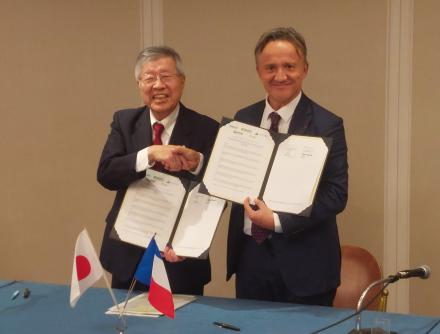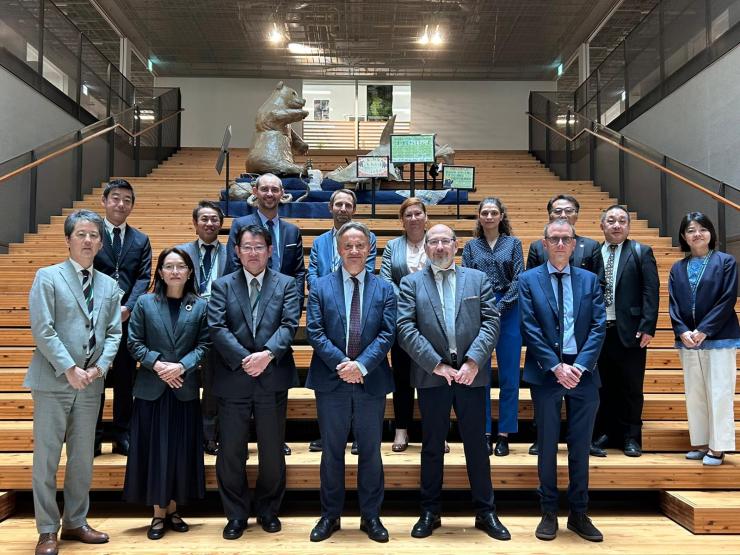In Japan, INRAE contributes to the launch of the international RhizoNet network and to the global scientific dialogue
In October 2025, an INRAE delegation to Japan, led by INRAE Chair & CEO Philippe Mauguin, formally launched an international rhizosphere network, took part in discussions at the STS Forum in Kyoto, and explored new opportunities for scientific cooperation with Japanese universities and institutes.
Published on 13 October 2025

Launched in Japan with the start of the signing process by NARO and INRAE, the international research network RhizoNet is structured around plant genetic resources and advanced phenotyping technologies. RhizoNet’s progress will help strengthen research capacities to address the challenges of carbon neutrality and food security, by accelerating the development of new crop varieties adapted to climate change.
RhizoNet: connecting experts for soil sustainability
RhizoNet will bring together several leading research institutes specialized in root system phenotyping and plant breeding to explore the rhizosphere, where the roots, soil and microbiota all interact, and better determine the role of root systems in soil sustainability.
RhizoNet’s guiding premise is that future agricultural strategies including those to adapt to and mitigate climate change - must take account of the morphological and physiological characteristics of root systems, their plasticity and the genetic make-up of the processes that regulate them. This approach will enable improved resource capture in extreme conditions and increased soil carbon storage while meeting global food security needs.
This international network brings together INRAE, NARO - INRAE’s counterpart and main strategic partner in Japan - Wageningen University & Research (Netherlands), and the Leibniz Institute of Plant Genetics and Crop Plant Research (Germany).
It builds on high-throughput root phenotyping systems, jointly developed and continuously improved through the collaboration between INRAE and NARO in recent years, within the framework of Joint Linkage Calls (JLCs) [1] supporting scientific mobility, and draws on complementary expertise of both institutes.

The long-standing cooperation between INRAE and NARO, consistently supported through projects funded under the bilateral JLC programme, has played a major role in the emergence of this network.
RhizoNet complements other recent instruments of Franco-Japanese cooperation, such as the Robotics International Associated Laboratory (LIA) signed in 2024 with NARO, the 2RI PisiNET initiative launched in 2018 with several Japanese academic partners, the FREQUENCE LIA with the University of Tsukuba, and projects selected under the JLC framework, notably in the field of fermentation.
High-level dialogue on climate and food security
INRAE took part in the Science and Technology in Society (STS) Forum in Kyoto and the related scientific events, bringing the voice of the Institute and of French research to the international stage.
- During the STS Forum, Philippe Mauguin spoke in a session dedicated to biodiversity, alongside the heads of leading international research institutes. He recalled the central role of biodiversity and agroecology in the transition of agricultural and food systems.
“Research conducted at INRAE shows that agroecology and biodiversity do not have to come at the cost of productivity: they complement and strengthen each other. From rotating crops to combining plants, adopting agroforestry and crop–livestock integration, and promoting soil biodiversity, there are myriad nature-based solutions that improve yields, resilience and ecosystem health.
Away from the field, hedgerows, grasslands, wetlands and other natural areas help protect biodiversity and water resources, enhance carbon storage, and maintain habitat continuity. The soil health and biodiversity indicators we’ve developed at INRAE are now being used by government agencies to inform sustainable agricultural policies. This is a clear acknowledgement that sustainable, innovative and ambitious agriculture can be developed with biodiversity, rather than against it.” Philippe Mauguin, INRAE Chair & CEO
- At the Global Summit of Research Institute Leaders, held by RIKEN alongside the STS Forum, Philippe Mauguin contributed to discussions on the role of public research institutes in strengthening trust in science. He presented INRAE’s commitments to ethics, open science, collective scientific expertise and the co-construction of solutions with stakeholders in the field.
- At the Regional Action on Climate Change Symposium (RACC17), Thierry Caquet, vice-president of international policy, underscored the urgent need to rethink food security in a context of climate change through international cooperation and tangible solutions developed by research.
“Three actions can make a difference at the global scale: (i) better anticipating bioclimatic risks via shared warning systems, (ii) adopting efficient practices that are suited to local contexts, and (iii) providing sustainable support for small farmers, who are the most vulnerable.” Thierry Caquet, Vice-President of International Policy at INRAE
Digital agriculture and food–health links: building on Franco-Japanese synergies
A scientific seminar held at the French embassy highlighted the vibrant cooperation between INRAE and its Japanese partners in two pivotal areas for the agricultural and food system transitions: digital agriculture and the links between food and health.
- Digital agriculture: The projects discussed showed a convergence towards the use of robotics, sensors and AI to transform agricultural practices. The TREASURE international laboratory, which is jointly managed by INRAE and NARO, deals with phenotyping challenges and precision agriculture. The newly launched RhizoNet network fits into this approach: network partners use non-destructive imaging and artificial intelligence to better understand the rhizosphere, which is crucial to soil health.
- Food–health links: Joint projects are attempting to pinpoint the role of the microbiota and make use of microorganisms responsible for fermentation. The DIDGI-LAB project is exploring the effects of lactic acid bacteria on human health through digestion simulators. Other research is looking at finding new uses for food co-products through innovative approaches to fermentation based on strains from traditional Japanese foods.
Several meetings were also held with other leading Japanese institutions, such as Tokyo University of Agriculture (NODAI) and Kyoto University (KYODAI). These exchanges pave the way for upcoming agreements and aim to strengthen cooperation in shared research areas such as the microbiome and food biotechnologies.

[1] A joint linkage call (JLC) is a project that enhances mobility between research institutes. Successful projects fund travel by researchers between INRAE and a partner research institute. The goal is to build or facilitate a research project that tackles scientific themes jointly chosen by the two parties.
